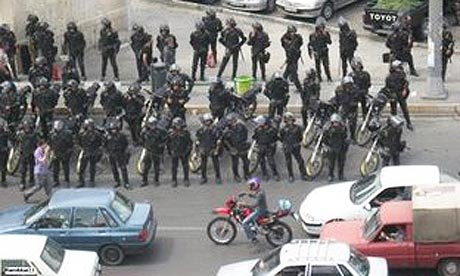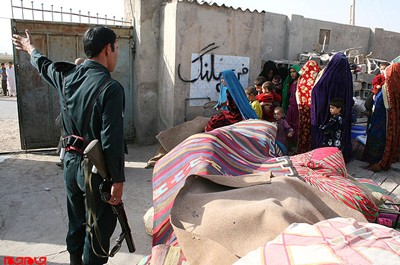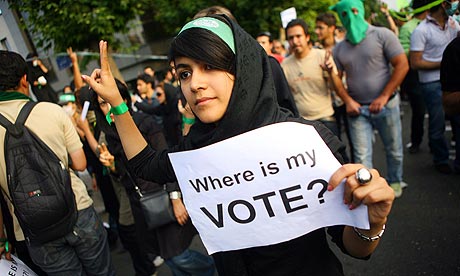President Barack Obama said Wednesday that he would wait for a while before deciding whether to send more US troops to Afghanistan. The administration is said to be deeply divided on the issue, and Obama says he wants further reports from the State Department and other civilian agencies before he makes a final determination.
Obama also rejected any analogy between Vietnam and Afghanistan: “You have to learn lessons from history. On the other hand, each historical moment is different. You never step into the same river twice. And so Afghanistan is not Vietnam.” Obama may be the first American president to quote pre-Socratic philosopher Heraclitus.
Obama, however, is taking an unusually anti-social science stance in saying this. Social history, political science and sociology are all premised on our ability to attain at least medium-range generalizations about big social movements and groups. Thus, the process of decolonization after WW II, while it unfolded differently in different colonies/ countries, did have some common or at least widespread characteristics. One of the reasons the Project for a New American Century and the Bush administration failed in their attempt to reinvent 19th-century empire in the 21st century is that peoples of the global south are now politically and socially mobilized en masse in a way they were not in 1850. Some 15,000 British troops could no longer hope to hold all of India. In some important respects, "Vietnam" partook of characteristics of decolonization and one could compare it to Algeria, e.g.
On Wednesday morning, MSNBC's "Morning Joe" had as a guest Jamie Rubin, an adjunct professor at the School of International and Public Affairs, Columbia U., and a "kitchen" adviser to Secretary of State Hillary Clinton and the president (also husband of CNN correspondent Christiane Amanpour). Rubin also took up cudgels against the Vietnam analogy. He said that in Vietnam the whole world was against the US, whereas in Afghanistan this is not the case. But the extremely wealthy Oil Gulf is against the US-- at least its private billionaires are-- and Pakistan is at least ambivalent. Russia is also ambivalent, worried about a permanent US landlocked aircraft carrier on the doorstep of Central Asia. And, anyway, movements sometimes succeed even if they are based only on one ethnicity in a country and even if they are mainly indigenous.
Here's a key exchange:
"MR. BARNICLE: . . . Admiral Mullen said yesterday in a public forum, a Senate hearing, that one of the things we've done very badly, we've under- resourced very badly for four or five years our commitment to Afghanistan.
That is basically throwing the prior Joint Chiefs and the top military command and an administration right under the bus.
MR. RUBIN: Well, I think he has. He's thrown under the bus the effort that went into Afghanistan for six, seven years, is the point I was making. He's making the argument for resetting the clock.
The Bush administration, the military, the Pentagon -- including Secretary Gates, who's still there, are all focused on Iraq. They put the best troops, the best intelligence, the best resources, the daily commitment to Iraq. And yes, in 2008 we had a turnaround there.
The fundamental question that the Congress is going to face, and I think administration officials are struggling with, is is Iraq a reasonable analogy now?
Will the surge that worked in Iraq, is there an analogous situation in Afghanistan?
If have top-level effort, if the president focuses on it, if we have additional surge of military forces, if we reset the objectives --
Because we lowered the objectives in Iraq, where we began working with Sunni warlords that previously we weren't prepared to work with.
So if we lower the objectives and increase the resources, I believe we can achieve this mission.
But we're going to have to have a serious national debate over the next several months in order to do that, and I think we're going to need to hear a lot more from the administration about all of these issues.
And we need to really, really put to bed the issue that I think is behind everybody here, which is that this is another Vietnam.
And I think that Vietnam is a terribly debilitating analogy for our country. Every time something is difficult, we say, oh, it's Vietnam.
Afghanistan and Vietnam have nothing to do with each other. The whole world is on our side in Afghanistan; the whole world was clearly not on our side in Vietnam.
The people in Afghanistan prefer an outcome that's not the Taliban, while in Vietnam, as you know, the situation was different.
So let's take that analogy, throw it out the window, and deal with the facts on the ground. It's going to be hard enough, with those facts, to win the argument."
I was one of the first analysts to warn that Afghanistan could turn into a Vietnam for President Obama, so of course I do not agree with Rubin. And his remarks frankly worry me because he is making an analogy from
Iraq to Afghanistan, which just won't work.
First of all, official Washington has never understood the real reason for which rates of civilian deaths fell dramatically in Iraq in late 2007 and through 2008, compared to the almost apocalyptic death rate in 2006-2007 during the Sunni-Shiite civil war kicked off by the Feb. 2006 bombing of the Askariya "Golden Domed" shrine in Samarra.
Beginning in a big way in summer of 2006 and continuing for at least a year, the Shiites of Baghdad and its environs determinedly and systematically ethnically cleansed the Sunnis from the capital. I figure that over a million people were likely displaced. Mixed neighborhoods such as Shaab became wholly Shiite. Baghdad went from being 50/50 Sunni-Shiite, more or less, in 2003 to being perhaps 85%-90% Shiite today. Much of the violence of the civil war period was the result of neighborhood fighting between adherents of the two branches of Islam, so when the Sunnis were expelled (many of them all the way to Amman and Damascus), the violence naturally declined substantially.
Rubin thinks that the violence declined because the US government began being willing to enlist Sunni militiamen to fight radical fundamentalists and Baathists. But the Sunnis took the deal in part because they were losing so badly. And, the main effect of the Awakening Councils or Sons of Iraq was in al-Anbar Province, which only has a little over a million people out of Iraq's 27 million, not in Baghdad. In the capital they probably just stopped the ethnic cleansing of Sunnis.
The reasons the Shiites won the civil war in Iraq include:
1) Shiites were the majority, with 60% of the population;
2) Shiites had militias such as the Badr Corps and the Mahdi Army to carry out the ethnic cleansing;
3) Shiites had gained control of an oil state and had significant monetary resources;
4) Next-door Shiite Iran offered enormous resources and facilities to the Iraqi Shiites, helping them avoid being strangled by the Sunni Arabs of the west and north. In essence, the US caught a big break insofar as its main regional enemy happened to have the same basic objectives in Iraq as did the US, reinforcing Washington's policies.
5) Most Shiites and their Kurdish allies (altogether some 80% of the population) saw the al-Maliki government as legitimate, though most Sunni Arabs did not.
6) Shiites had gained control of the newly trained army and security forces and could deploy them against Sunnis, since the new recruits were largely literate, increasingly well-trained, and motivated to stop Sunni violence against their relatives;
7) US troops disarmed the Sunnis in the capital first, before turning to Shiite militias, leaving the Sunnis helpless before 2) and 3) above; and
8) Most Sunni Arabs in Iraq were and are secular nationalists who resented the religious extremism of many of the guerrillas, and whose tribes began to have a feud with the Islamic State of Iraq because it bombed Sunni young men seeking recruitment into the national police.
Afghanistan differs from Iraq in the following respects:
1) The Pashtuns from whom the anti-government forces derive are some 44% of the population, not a 20% or less minority the way the Sunnis of Iraq are. While most Pashtuns still reject the guerrillas, so did most Sunni Arabs reject the extremist guerrillas; the latter still controlled significant swathes of Sunni Iraq. The Taliban and kindred groups are a significant presence everywhere there are large Pashtun populations.
2) The Tajik and Hazara militias have largely been demobilized and are not available for deployment against the Taliban and other fundamentalist groups. The pro-Kabul Pashtuns typically do not have militias.
3) The pro-Karzai Pashtuns, Tajiks, Hazara Shiites and Uzbeks that form the ruling clique are not united, and the government they dominate is extremely weak and poverty-stricken (the GDP in international currency [not purchasing power parity] is only about $9 bn a year, and the government budget is a little over $1 bn.). Iraq has something close to $70 bn. in reserves from oil sales. The Afghan government controls only 30% of the country. The country is resource-poor and there is no prospect of it having a proper tax base for a competent bureaucracy and army any time soon.
4) The Pashtun plurality is backed by the enormous Sunni country of Pakistan, whereas the pro-Kabul Pashtuns have no regional foreign patron to speak of; Iran generally supports the Tajiks and Hazaras, but it is hard to discern that they have pumped very significant resources into the country. In essence, Washington's regional ally, Pakistan, is ambivalent about the Tajik/Hazara/Uzbek takeover of Kabul and not close to Karzai's faction of Pashtuns.
5) In the aftermath of the recent election, probably a majority of Afghans and of Pashtuns sees the Karzai government as corrupt and illegitimate.
6) The Afghan army has faced extreme difficulties in training and expansion. Some 90% of the troops are illiterate, which limits how much they can be trained and even their ability to read street signs when they are sent into an unfamiliar city. (Iraq's literacy rate is 76%). Many Afghan troops lack discipline and some proportion regularly use recreational drugs during work hours. There is no evidence of any great esprit de corps or attachment to the Karzai government, in contrast to the Iraqi army's willingness to fight for PM Nuri al-Maliki and his ruling coalition.
7) US troops have proven unable to disarm the Taliban, Hizb-i Islam, or the Haqqani group. The number of fighters attached to these guerrilla groups has grown from 3,000 a few years ago to 15,000- 20,000 today. They are local, know the terrain, and receive patronage and support from Pashtun tribes who resent the foreign troop presence.
8) Pashtuns are not for the most part secularists, and a combination of religious and nationalist rhetoric such as is deployed by old-time guerrilla leader Gulbadin Hikmatyar and his "Islamic Party" has a great deal of appeal to them. Although the Taliban are only thought well of by 5% of Afghans in polls, that is probably 10% of Pashtuns. And many of the guerrilla groups opposing Karzai are not properly called Taliban (Pashtuns in Kunar Province are not thinking of Islamic Party when they denounce Taliban). Virtually no Pashtuns, who are a plurality of the country and the largest single ethnic group, want US or NATO troops in their country.
So Afghanistan is not very much like Iraq (there are other differences, as in the organization of the tribes), and if Rubin advises H. Clinton and Obama to depend on a "surge" plus a "Sons of Afghanistan" artificial militia policy, I think that would be dangerous advice.
Afghanistan is more like Vietnam than Obama and Rubin suggest. And, it is becoming more like it all the time.
By the way, Mr. Rubin, we Americans don't call "anything that is hard" Vietnam. We don't call keeping up a space station "Vietnam" or getting universal health care "Vietnam." We invoke Vietnam against long, costly Asian land wars, the objectives of which are murky and the medium-term and long-term success of which is in significant doubt. And by these criteria, Afghanistan has "Vietnam" written all over it.
End/ (Not Continued)
For "cont'd" postings, click here.















 |
|
 Facebook
Facebook




